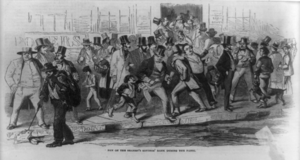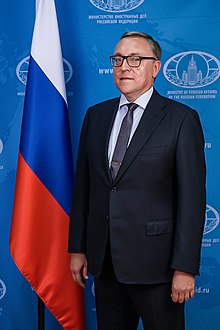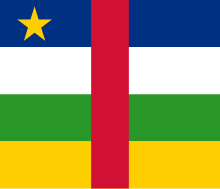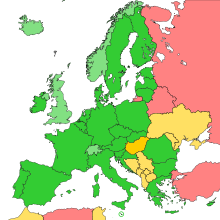Portal:Politics
| Main | Topics and categories | Tasks and projects |
The Politics portal
Politics (from Ancient Greek πολιτικά (politiká) 'affairs of the cities') is the set of activities that are associated with making decisions in groups, or other forms of power relations among individuals, such as the distribution of status or resources. The branch of social science that studies politics and government is referred to as political science.
Politics may be used positively in the context of a "political solution" which is compromising and non-violent, or descriptively as "the art or science of government", but the word often also carries a negative connotation. The concept has been defined in various ways, and different approaches have fundamentally differing views on whether it should be used extensively or in a limited way, empirically or normatively, and on whether conflict or co-operation is more essential to it.
A variety of methods are deployed in politics, which include promoting one's own political views among people, negotiation with other political subjects, making laws, and exercising internal and external force, including warfare against adversaries. Politics is exercised on a wide range of social levels, from clans and tribes of traditional societies, through modern local governments, companies and institutions up to sovereign states, to the international level.
In modern nation states, people often form political parties to represent their ideas. Members of a party often agree to take the same position on many issues and agree to support the same changes to law and the same leaders. An election is usually a competition between different parties.
A political system is a framework which defines acceptable political methods within a society. The history of political thought can be traced back to early antiquity, with seminal works such as Plato's Republic, Aristotle's Politics, Confucius's political manuscripts and Chanakya's Arthashastra. (Full article...)
Selected article
The political integration of India established a united nation for the first time in thousands of years from a plethora of princely states, colonial provinces and possessions. Despite partition, a new India arose above demographic distinctions to unite peoples of various geographic, economic, ethnic, linguistic and religious backgrounds. India was transformed after independence through political upheaval and ethnic discontent, and continues to evolve as a federal republic natural to its diversity. The process is defined by sensitive religious conflicts between Hindus and Muslims, diverse ethnic populations, as well as by geo-political rivalry and military conflicts with Pakistan and China. When the Indian independence movement succeeded in ending British Raj on 15 August 1947, India's leaders faced the prospect of inheriting a nation fragmented between medieval-era kingdoms and provinces organized by colonial powers. Under the leadership of Sardar Vallabhbhai Patel, one of India's most respected freedom fighters and the Minister of Home Affairs, the new Government of India employed frank political negotiations backed with the option of military action to weld a nation.
Featured picture

Dr. Javier Solana was the High Representative for the Common Foreign and Security Policy and the Secretary-General of both the Council of the European Union (EU) and the Western European Union (WEU). This photograph shows him discussing with students of RWTH Aachen University, one day before receiving the International Charlemagne Prize of the city of Aachen.
Selected quote
Selected biography
Cleopatra VII Thea Philopator (Koinē Greek: Κλεοπάτρα Θεά Φιλοπάτωρ, lit. 'Cleopatra father-loving goddess'; 70/69 BC – 10 August 30 BC) was Queen of the Ptolemaic Kingdom of Egypt from 51 to 30 BC, and its last active ruler. A member of the Ptolemaic dynasty, she was a descendant of its founder Ptolemy I Soter, a Macedonian Greek general and companion of Alexander the Great. Her first language was Koine Greek, and she is the only Ptolemaic ruler known to have learned the Egyptian language. After her death, Egypt became a province of the Roman Empire, marking the end of the last Hellenistic-period state in the Mediterranean, a period which had lasted since the reign of Alexander (336–323 BC).
Did you know (auto-generated) -

- ... that although Uzun-Hajji and Najmuddin of Gotzo were originally political allies, they later fought on opposing sides of the Russian Civil War?
- ... that artist Tove Jansson based the children's book character Snufkin on a political philosopher whom she had dated?
- ... that the continuing influence of the Catholic Church in the politics of the Philippines means that the country lacks a divorce law?
- ... that political philosophy professor Werner J. Dannhauser was the basis for a character in a Saul Bellow novel?
- ... that in her 2021 book White Evangelical Racism, professor of religion Anthea Butler called American evangelicalism a pro-Trump, "nationalistic political movement"?
- ... that Ingrid Andress came up with "Lady Like" after being rejected by a man when she brought politics up?
More did you know...
- ...that anarchism once was the strongest current in the Cuban labor movement?
- ...that the National Assembly of Azerbaijan was the first secular republican parliament in the Muslim world?
- ...that in world-system theory, sociologists debate whether two world-systems have ever existed during the same period?
- ...that former Republican California State Senator Becky Morgan served on the Board of Trustees of both her alma maters, Stanford University and Cornell University?
- ...that the New Zealand McGillicuddy Serious Party wanted to return to a medieval lifestyle and establish a monarchy based on the Scottish Jacobite line?
- ...that the Proletarian Revolutionary Organisation of Nepal proposed a synthesis of Buddhism and Maoism in 1977?
In this month
- November 4, 1980 – Ronald Reagan defeats Jimmy Carter in the presidential election and becomes the 40th President of the United States.
- November 4, 2008 – Barack Obama was elected as the 44th President of the United States, becoming the first African American elected to the office. Congressional elections for the House of Representatives and one third of the Senators (second class) were also held.
- November 7, 2000 – Hillary Rodham Clinton is elected to the United States Senate, becoming the first First Lady of the United States to win public office.
- November 7, 1917 – The workers of the Petrograd Soviet in Russia, led by the Bolshevik Party and leader Vladimir Lenin, storm the Winter Palace and successfully destroy the Kerensky Provisional Government, resulting in the first overthrow of capitalism in history.
- November 11, 2004 – Former Palestinian President Yasser Arafat dies from a mysterious illness, aged 75.
- November 21, 2004 – Ukrainian presidential election, 2004: Viktor Yanukovych is declared the winner in the final round. International election observers express severe criticism, and large crowds gather in a protest rally in Kiev; 12 days later, the Supreme Court annuls the result, and a new poll is scheduled.
- November 22, – In Dallas, Texas, United States President John F. Kennedy is assassinated, Texas Governor John B. Connally is seriously wounded, and Vice President Lyndon Baines Johnson becomes the 36th President. All television coverage for the next four days is devoted to the assassination, its aftermath, the procession of the horsedrawn casket to the Capitol Rotunda, and the funeral of President Kennedy. Stores and businesses shut down for the entire weekend and Monday, in tribute.
News and Current events
- August 11: 4 local government areas in New South Wales, Australia locked down after COVID-19 case
- August 11: Australia: AstraZeneca vaccine access expanded by Victorian government
- August 1: Australia: Victorian lockdown lifted
- July 29: Tunisia's president dismisses prime minister, suspends parliament
- July 25: Australia: Wikinews interviews Reg Kidd, mayor of the City of Orange, about COVID-19 lockdown and local government
- July 23: South Australia enters week-long lockdown to contain COVID-19 Delta variant spread
- July 21: Technological University Dublin senior lecturer Dr Lorcan Sirr speaks to Wikinews on housing market in Ireland
- July 21: Three rural councils in New South Wales, Australia enter 7-day lockdown
- July 21: Australia: Victoria lockdown extended by a week with 85 active cases recorded
- July 15: California governor signs new state budget, eligible Californians to get stimulus payments
Topics and categories
General images
Related portals
Associated Wikimedia
The following Wikimedia Foundation sister projects provide more on this subject:
-
Commons
Free media repository -
Wikibooks
Free textbooks and manuals -
Wikidata
Free knowledge base -
Wikinews
Free-content news -
Wikiquote
Collection of quotations -
Wikisource
Free-content library -
Wikiversity
Free learning tools -
Wiktionary
Dictionary and thesaurus































































